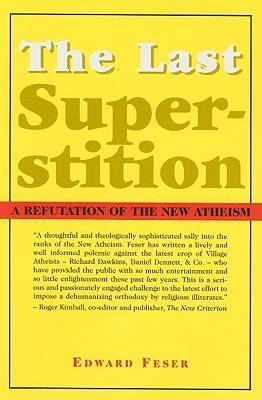

The Last Superstition: A Refutation of the New Atheism
by Edward Feser
"The central contention of the "New Atheism" of Richard Dawkins, Daniel Dennett, Sam Harris, and Christopher Hitchens is that the centuries-old "war between science and religion" is now over and that religion has lost. But as Edward Feser shows in The Last Superstition, there is not, and never has been, any war between science and religion at all. There has instead been a conflict between two entirely philosophical worldviews: the classical "teleological" vision of Plato, Aristotle, Augustine, and Aquinas, on which purpose or goal-directedness is as inherent a feature of the material world as mass or electric charge; and the modern "mechanical" vision of Descartes, Hobbes, Locke, and Hume, according to which physical reality is comprised of nothing more than purposeless, meaningless particles in motion." "This modern "mechanical" view of nature has never been proved, and its hold over the contemporary intelligentsia owes more to rhetorical sleight-of-hand and political expediency than to rational argument. For as Feser demonstrates, the existence of God, the immortality of the soul, and the traditional natural-law conception of morality are rationally unavoidable given the classical "teleological" philosophical world-view. Hence modern secularism crucially depends on the false insinuation that the "mechanical" philosophy has somehow been established by science." Moving beyond what he regards as the pointless and point-missing dispute between "Intelligent Design" advocates and Darwinians, Feser holds that the key to understanding the follies of the "New Atheism" lies not in quibbles over the evolutionary origins of this or that biological organ, but in a rethinking of thephilosophical presuppositions of scientific method itself back to first principles. In particular, it involves a recovery of the forgotten truths of classical philosophy. When this is accomplished, religion can be seen to be grounded firmly in reason, not blind faith. And despite its moral and intellectual pretensions, the "New Atheism" is exposed as resting on very old errors, together with an appalling degree of intellectual dishonesty, philosophical shallowness, and historical, theological, and scientific ignorance.
Release Date:
October 12, 2008

